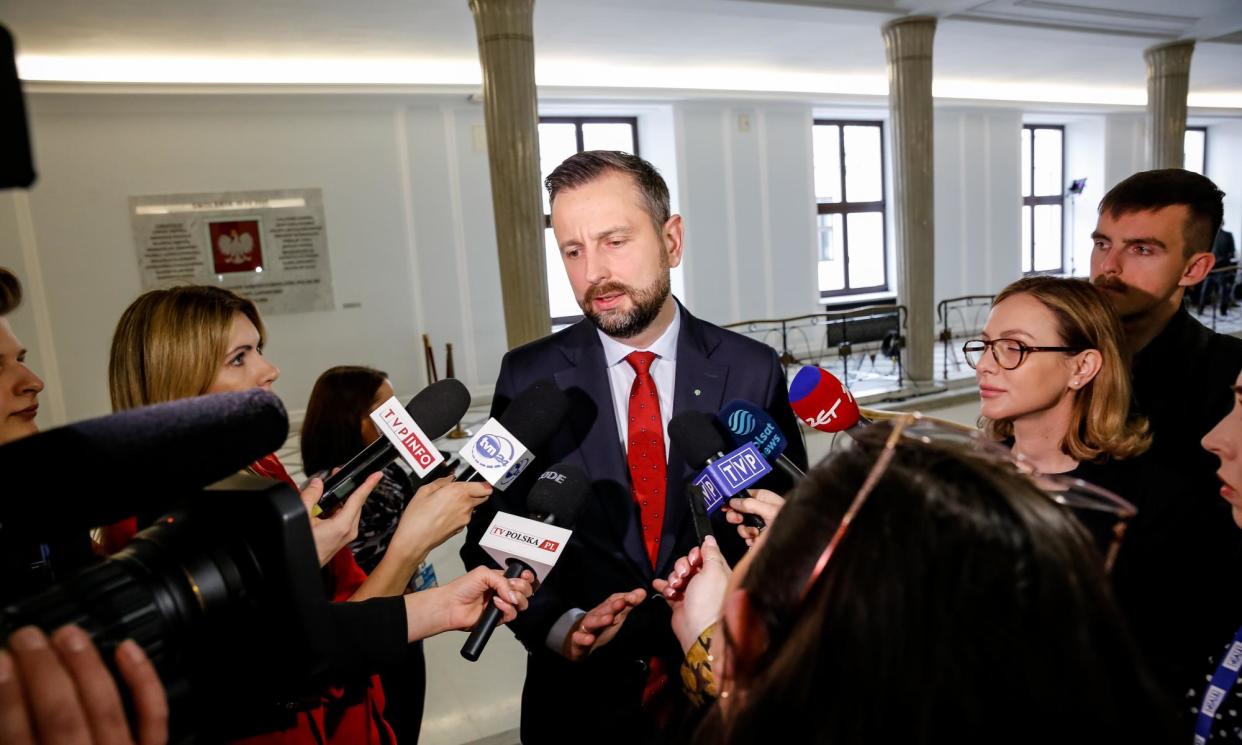Poland and Lithuania pledge to help Kyiv repatriate Ukrainians subject to military draft

Poland and Lithuania have said they are prepared to help Ukrainian authorities return men subject to military conscription to the country, after Kyiv announced this week that it was suspending consular services for such men who were now abroad.
“We have suggested for a long time that we can help the Ukrainian side ensure that people subject to [compulsory] military service go to Ukraine,” Władysław Kosiniak-Kamysz, Poland’s defence minister, told the television channel Polsat, though he did not elaborate on what mechanisms could be used.
His Lithuanian counterpart, Laurynas Kasčiūnas, said his country may make similar efforts. “Ukraine is very short of mobilisation reserve … This is not fair to those citizens who are fighting for their country,” he said on Thursday.
Ukraine is struggling to overcome a huge equipment and personnel deficit in comparison with Russian troops at the frontline. The parliament has recently passed a new law on mobilisation, which lowers the age at which men can be called up from 27 to 25.
Callout
On Wednesday, the foreign ministry announced that it would suspend consular services for men subject to the draft who were living abroad. There were angry scenes at consular offices and agencies in Poland later in the day, where men who had booked appointments to pick up documents were told they could not do so.
Ukraine’s foreign minister, Dmytro Kuleba, told the Guardian on Wednesday that it was unacceptable for Ukrainian men outside the country to “sit down in restaurants” while others were dying, and said the move was partly about demonstrating fairness to those who were at the front. “They don’t understand why the government is not trying to bring more people into the war effort,” he said.
Thousands of men are believed to have crossed Ukraine’s western borders illegally since the war began, sometimes paying bribes to make it across. However, many other Ukrainian men have lived outside the country for years. Some returned after the war started, but many have lives and families outside the country and do not wish to return. There are also many Ukrainian men in Europe from war-torn eastern areas of the country who left their homes via Russia in the early stages of the war as it was the only way out.
Igor Lisin, vice-president of Foundation Ukraine, an organisation working with Ukrainians in Poland, said that while there were no official figures for how many men of military age were currently living outside the country, as a “very rough estimate” he believed about 300,000-400,000 were currently in Poland.
Tadeusz Kołodziej, a lawyer with the Ocalenie Foundation, a Polish NGO, said there was no mechanism by which Polish authorities could deport Ukrainian men to Ukraine, and no current plans to declare their presence in the country illegal.
But the Polish parliament is due to consider new regulations next week that would require all Ukrainians to show a valid passport to be able to access benefits in Poland. Previously, Ukrainian refugees had been able to do so by showing any other documents proving their identity.
“The draft text we have seen would cut around 80% of benefits for people without passports,” Kołodziej said. In time, there may also be questions about whether people without a passport can work legally. “If it will be impossible to get a passport, many of these people may ask for asylum,” Kołodziej added.
Exactly how the new regulations will work may not be clear until the new law on mobilisation comes into force in mid-May. It is possible that men will be able to update their records in the military register using an app from outside the country, rather than returning home to do so.
“Of course, they want people to come back, but there is no legal instrument to force them,” said Lisin. However, he said the recent messaging had caused stress and fear among many in Poland’s Ukrainian community, partly because of the uncertainty over how it would work in practice. “The less people know, the more people fear,” he said.
Poland drew plaudits for the way it opened its borders to Ukrainian refugees in the first months of the war and the Polish government remains one of Ukraine’s most vocal backers in the EU. However, there has been evidence of increasing “Ukraine fatigue” in Polish society as the war drags on. Protests by Polish truckers over transit access for their Ukrainian counterparts blocked the border between the two countries for several weeks, while surveys show attitudes to Ukrainian refugees are becoming gradually less welcoming.
“I think many Poles are outraged when they see young Ukrainian men in hotels and cafes, and they hear how much effort we have to make to help Ukraine,” said Kosiniak-Kamysz.


